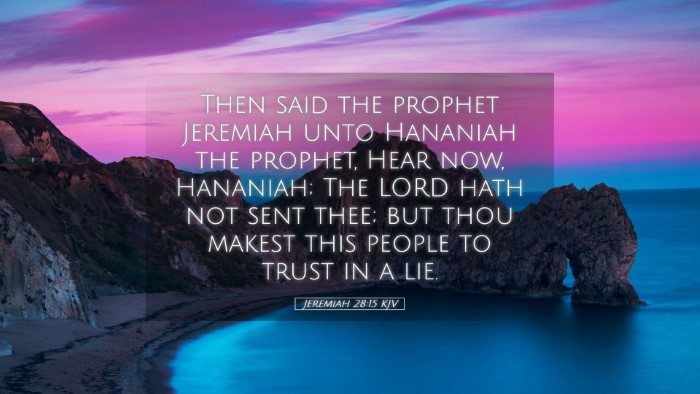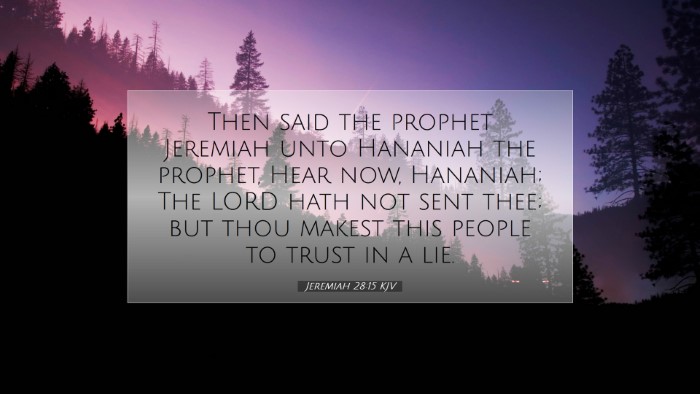Commentary on Jeremiah 28:15
Jeremiah 28:15 reports a critical moment in the prophetic ministry of Jeremiah, reflecting the battle of words between true and false prophets in Israel's history. The verse states:
"Then Jeremiah the prophet said to Hananiah the prophet, 'Listen, Hananiah! The Lord has not sent you, but you have made this people trust in a lie.'" (Jeremiah 28:15, NIV)
Contextual Background
To understand Jeremiah 28:15, one must consider the broader context of Jeremiah's ministry during a time of national crisis for Judah. Babylonian pressure was mounting, and there were competing messages regarding God's intentions, particularly illustrated in the encounter between Jeremiah and Hananiah.
The Battle of Prophets
This passage captures a significant conflict between true and false prophets, a recurring theme in prophetic literature.
- Jeremiah as the True Prophet: Jeremiah had been faithfully delivering messages of warning and impending judgment from the Lord. His historical and theological role was to prepare the people for the consequences of their sins.
- Hananiah as the False Prophet: In contrast, Hananiah represents those who comfort the people with false assurances. He proclaimed a message of peace and immediate relief from Babylonian control.
Message of Deception
Hananiah's claims are not only misleading but demonstrate a tendency towards spiritual complacency among the people of Judah. The danger lies in the fact that such false prophecies can lead people away from genuine repentance and reliance on the true God.
Commentary Insights
From Matthew Henry
Henry emphasizes: that the direct address from Jeremiah to Hananiah highlights the serious nature of false prophecy. He notes that Hananiah's boldness in proclaiming peace when judgment was imminent underscores his lack of insight and spiritual discernment. Jeremiah’s confrontation serves a dual purpose:
- To expose Hananiah's falsehood: Jeremiah boldly asserts that Hananiah is not sent by God, illustrating the necessity of discernment among the people regarding prophetic messages.
- To reaffirm God’s sovereignty: It emphasizes that God's plans cannot be thwarted by counterfeit promises of peace, thereby reminding believers of the importance of aligning with the truth of God’s word.
From Albert Barnes
Barnes provides context: by noting the historical significance of the message. He interprets Jeremiah's words as a call to recognize the true nature of prophecy. Barnes elaborates on the consequences of believing such false prophecies:
- Impact on the Community: By misleading the people, Hananiah not only deceives them spiritually but also damages their character and relationship with God.
- Active Faith in Difficult Times: He stresses the importance of remaining steadfast in faith amidst uncertainties, aligning with God’s will even in times of trial.
From Adam Clarke
Clarke enriches the commentary: by highlighting the historical tradition of prophetic ministry in Israel. He argues that Jeremiah's role in confronting Hananiah was not just personal but pivotal for the nation's future:
- Prophetic Responsibility: Jeremiah’s confrontation with Hananiah illustrates the weighty responsibility of the prophet to speak the truth regardless of popular sentiment.
- Consequences of Deception: Clarke underscores the detrimental effects of misrepresenting God's message, which can cultivate a false sense of security among the people.
Theological Reflections
This passage leads us to several theological insights that are essential for pastors, students, theologians, and Bible scholars:
- Discernment Necessary: The need for discernment in evaluating messages we receive within faith communities cannot be overstated. Believers are called to test all spirits (1 John 4:1).
- Courage in Prophetic Integrity: Like Jeremiah, those called to speak on God’s behalf must exercise courage and integrity, even when it means standing alone against popular opinion.
- God’s Sovereignty Amidst Falsehood: This narrative reassures believers that God remains sovereign over all, and His true message will prevail over lies and deceit.
Practical Applications
In light of Jeremiah 28:15, several practical applications emerge for contemporary readers:
- Commit to Sound Theology: Pastors and teachers should prioritize sound doctrine and ensure that their teachings align with Scripture.
- Encourage Critical Thinking: Encourage congregations to engage with Scripture critically, cultivating a culture of inquiry and understanding.
- Foster Open Dialogue: Create environments where questioning and discussion about theological and prophetic claims can take place.
Conclusion
The confrontation between Jeremiah and Hananiah illustrates timeless truths about prophecy, the nature of God’s message, and the responsibilities of believers. As the church continues to navigate challenging times, the lessons from Jeremiah 28:15 remain relevant: discernment, courage, and unwavering faith are paramount in the pursuit of truth.


